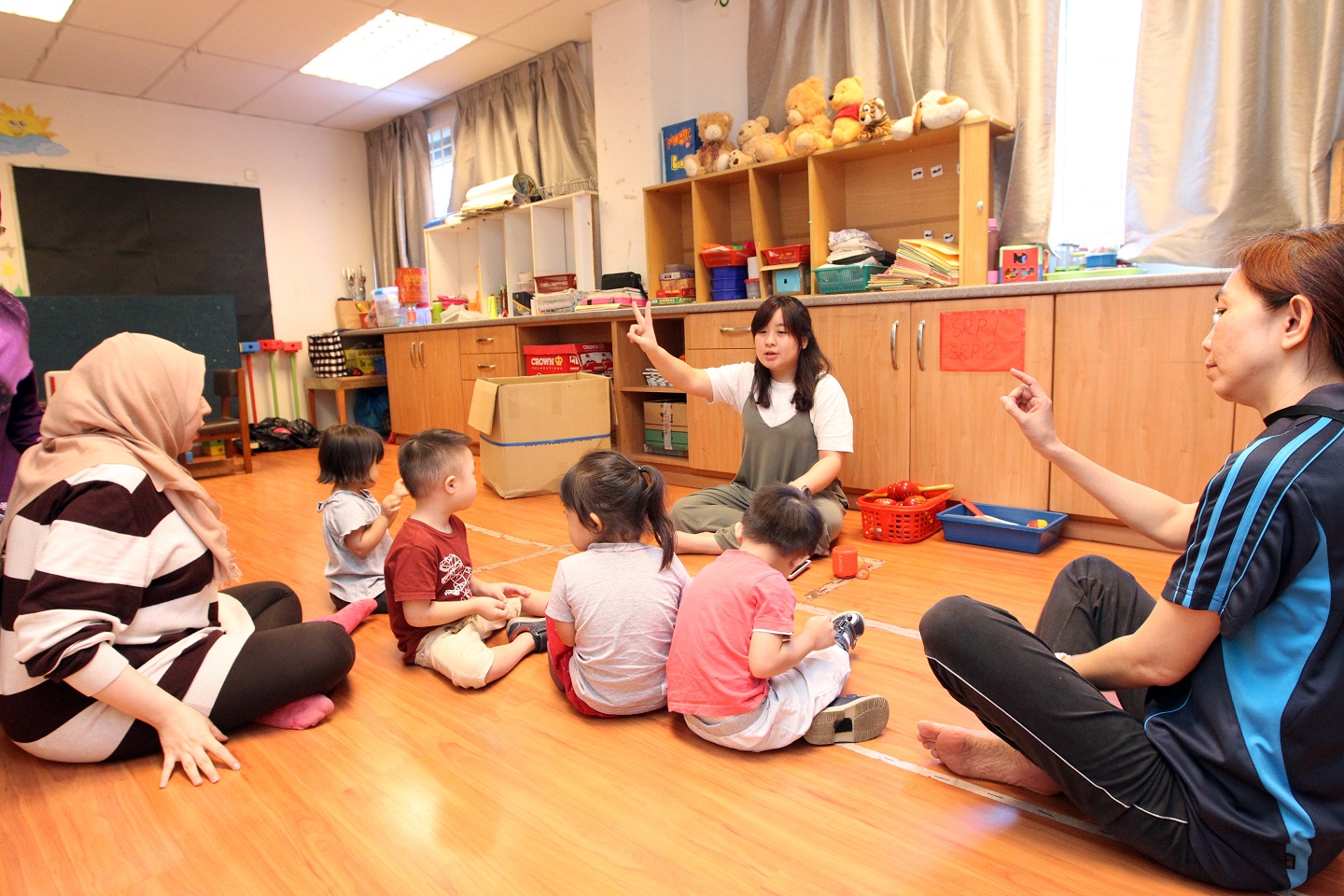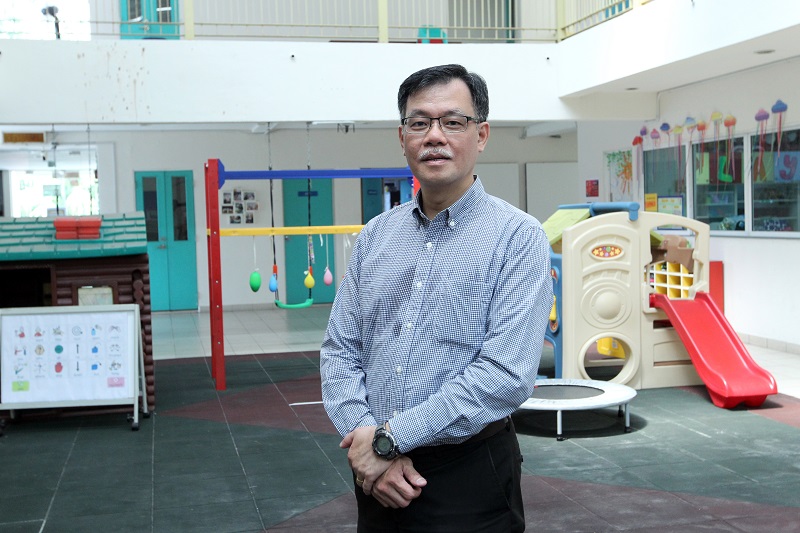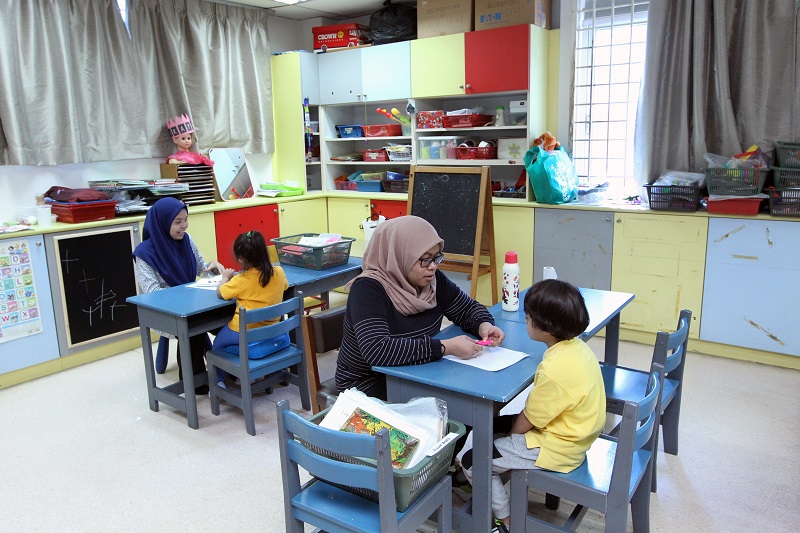
Spanning 22,000 sq ft, the Kiwanis Down Syndrome Foundation was opened in 2005 by the late Tun Endon Mahmood, wife of then prime minister Tun Abdullah Ahmad Badawi (All photos: Kenny Yap/The Edge)
The Kiwanis Club in Malaysia suffers from a rather unusual — and perhaps a little enviable — branding problem. “People tend to think that our Down syndrome centre is the only project we do,” smiles Chan Kin Hou, the chairman of Kiwanis Down Syndrome Foundation-National Centre (KDSF-NC) in Petaling Jaya, Selangor. “It is actually the long-term project of the Kiwanis Club of Kuala Lumpur (KCKL), but the centre has been so successful that it has now become what Kiwanis is most famous for.”
Kiwanis International was founded in the US in 1915, with the objective to improve the world by focusing on the needs of children. The organisation now exists in 80 countries, and was established by Tan Sri Khir Johari in Malaysia in 1976. Long-term projects have become a hallmark of Kiwanis Malaysia, with clubs all over the nation encouraged to establish a mission of their own — for example, the Bangsar club manages a stroke and neurological rehabilitation centre.
Recognising that facilities for children with special needs were limited and awareness of Down syndrome was scant, KCKL members obtained the assistance of Malaysian Care and clinical psychologist Robert Deller to establish the Kiwanis Down Syndrome Centre in Petaling Jaya in 1989. What was then called the KDSF — Petaling Jaya Centre started with just two teachers and 15 children in a rented bungalow in Jalan Gasing, and the foundation was established a year later, solidifying the organisation’s support for the cause.
Creating a foundation also encouraged other clubs to follow suit, since there was a template of sorts and a success story to work from — Kiwanis clubs in Klang, Melaka, Kulai and Johor Baru have also opened their own Down syndrome centres. The largest is the branch in Taman Sea, PJ, but the centre has long since outgrown the two bungalows it occupied and successfully raised funds for a fully integrated facility that serves the needs of 130 children from infanthood to six years old. Spanning 22,000 sq ft, the KDSF-NC was opened in 2005 by the late Tun Endon Mahmood, wife of then prime minister Tun Abdullah Ahmad Badawi.
KDSF-NC looks much like any other kindergarten. A collection of playground equipment occupies a shaded, sun-lit central courtyard and tiny shelves touchingly dotted with colourful children’s shoes demarcate classroom doors. There is laughter and music coming from the toddlers’ class, while older children being prepared for public school are getting some help with basic, yet necessary skills — everything from learning how to cross a drain to self-feeding. Physical and occupational therapy also form a major part of the curriculum, particularly for infants. Every year, KDSF-NC organises field trips, sports carnivals, concerts and graduation ceremonies — experiences that are the right of all children.
20191009_peo_chan_kin_hou._chairman_of_kiwanis_down_syndrome_foundation_national_centre_1_ky.jpg

The objective of KDSF-NC’s curriculum is to provide early intervention programmes for children with Down syndrome. Also known as trisomy 21, this genetic disorder is caused by the presence of all or part of a third copy of chromosome 21 and is usually associated with physical growth delays, intellectual disabilities and characteristic facial features. A huge upswing in our collective understanding of this condition has been beneficial — there is more focus on what each child is capable of and how much they have in common with hetero-normative children.
“The idea is for them to join mainstream schooling, and early intervention is very important for that to happen. If we do not address the [developmental] delays early on, it becomes so much harder when the children are older,” says KDSF-NC executive director Angie Heng. But KDSF does not just support children with Down syndrome, it assists their parents as well. “The parents receive and provide counselling and basically back each other up. We give them a lot of training as well, so the entire family gets the support they need.” As any parent of a differently-abled child will say, support from other mothers and fathers is invaluable.
Without Kiwanis’ subsidy, the cost per child, per term would be about RM800 but the maximum fee at present is just RM350 — and the organisation relies on public donations to cover the shortfall over and above what the Kiwanis club itself puts in. While the centre manages to keep costs fairly low, qualified trainers and educators, skilled therapists and modern medical equipment do not come cheap — the annual expenditure is at least RM1.2 million. “We have never been in the red, always in the black. Never hand-to-mouth,” Heng says proudly. “But we need to continuously raise funds to ensure we stay that way.”
“We do get ad-hoc donations from the public, which we are very grateful for, but we also need to keep our reserves. We have been around for 30 years because we have always looked forward and planned ahead,” says Chan. “It has been getting more challenging, and we need to be very proactive in getting funds.”
More awareness and understanding as well as the reduction of taboos associated with differently-abled children have had a positive effect on centres like KDSF-NC, but these need to translate into tangible support. At present, financial contributions are most important to ensure the centres remain in the best condition and the educators themselves can be continually trained and given the necessary assistance. “There is an impression that we are cash-rich and that all Kiwanians are well-off, which is probably because most of our members are working professionals or retired businessmen,” says Chan, who volunteers at KDSF outside of his full-time job in IT. “But the causes we support still need help.”
20191009_peo_kiwanis_down_syndrome_foundation_national_centre_1_ky.jpg

KDSF-NC’s fundraising event for this year is special as it celebrates 30 successful years of assisting more than 2,000 children with Down syndrome and their families as well as scores of volunteers, teachers, donors and community members who have been of invaluable support. The 30 Magical Years charity gala dinner was held on Nov 1 at the HGH Convention Centre. Apart from a sumptuous dinner, it included performances by the String Ensemble of the klpac Orchestra, The Philharmonic Society of Selangor, 24 Drums from SJKC Sentul, as well as a showcase by current and former KDSF-NC students.
Chan, whose chairmanship has just been extended for another two years, hopes to establish a KDSF-NC alumni group — an important element that will serve to inspire parents so they know what the future could look like for their child. Many children with Down syndrome grow up to become healthy, well-functioning adults with full, active lives but new parents often cannot see that far into the future. Alumni have the potential to play a crucial role in the emotional support both parent and child will require.
“I want to focus on a bit of rebranding, going forward, so Kiwanis and KDSF are recognised separately,” Chan muses. “The beauty of our team is that none of us have children who have Down syndrome, which is unusual. But I think it has worked to our advantage because we can look at things not as parents, but as managers of this amazing facility, looking from the outside. We have done very well. The alumni will help us showcase how well we have done and hopefully encourage more clubs to do the same, and we are keen to obtain feedback from them — maybe we can tweak our curriculum to better serve them, even at this stage. We hope to also become their voice, their advocate.”
Heng has seen many children come and go, and continues to be inspired by their unique personalities — all the KDSF centres do incredible work to create a supportive, holistic environment for these differently-abled children to flourish. “Our objective is to ensure each child is ready for mainstream school, and it brings us so much joy when they are ready well before the age of six — many children leave us before that to join regular preschools,” Heng says. “We think that focusing on the abilities of each child is the key to our success, and we believe this is something all children deserve.”
This article first appeared on Oct 21, 2019 in The Edge Malaysia.


